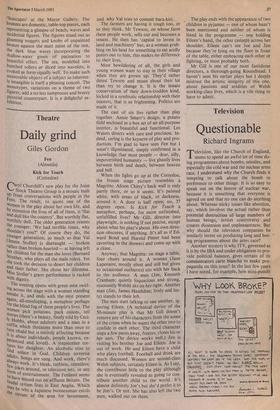Theatre
Daily grind
Giles Gordon
Fen (Almeida) Kick for Touch (Cottesloe)
Caryl Churchill's new play for the Joint Stock Theatre Group is a mosaic built al3 from conversations with people in the Fens. The result, to quote one of the women in the play about her own life, and by extension the lives of all of them, is 'flat and dull like the country'. But worthily flat, worthily dull. The older generation resents the younger: 'We had terrible times, why shouldn't you?' Of course they do, the Younger generation; so much so that Val (Jennie Stoller) is distraught — broken rather than broken-hearted — at having left her children for the man she loves (Bernard Strother, who plays all the male roles). Yet She took the decision to desert her children and their father. She chose her dilemma. Miss Stoller's grave performance is racked with dignity. The evening opens with green mist swirl- ing across the stage with a woman standing aniidst it, and ends with the mist present again, all-enveloping, a metaphor perhaps for the blind fog of these people's lives. The Women pick potatoes, pack onions, tell stories (there's a beauty, finely told by Ceci- IY Hobbs, about adultery and a man in a coffin which threatens more than once to turn ribald but is entirely affecting because it is about individuals, people known, ex- Perienced and loved). A stepmother tor- tures her daughter. An alcoholic tries to find solace in God. Children terrorise adults. Songs are sung. And work, there's always work. It's bleak, ruthless, relentless; few jokes around, or television sets, or any
form of entertainment. The Fenland seems to
have missed out on affluent Britain. The feudal system lives in East Anglia. Which ,Tay be why a Japanese businessman extols Lae virtues of the area for investment,
and why Val tries to commit hara-kiri.
The farmers are having it tough too, or so they think. Mr Tewson, on whose farm these people work, sells out and becomes a tenant. He then has 'capital to invest in land and machinery' but, as a woman grub- bing on his land for something to eat acidly points out to him, this makes no difference to their lives.
Most bewildering of all, the girls and young women want to stay in their village when they are grown up. They'd rather detest Tewson and moan about their lot than try to change it. It is the innate conservatism of their down-trodden kind, locked in a symbiotic relationship with their masters, that is so frightening. Politics are made of it.
The cast of six live rather than play together. Annie Smart's design, a potato field enclosed in a box set of an all-purpose interior, is beautiful and functional. Les Waters directs with care and precision. In- deed, caring is the keynote of play and pro- duction. I'm glad to have seen Fen but I wasn't illuminated, simply confirmed in a knowledge that most people — dear, silly, impoverished humanity — live ghastly lives between birth and death, between heaven and hell.
When the lights go up at the Cottesloe, the frozen stage picture resembles a Magritte. Alison Chitty's back wall is only partly there, or so it seems. It's painted white, with areas of black, or darkness, around it. A door is half open; no, 37 degrees open. Is Kick for Touch a metaphor, perhaps, for more unfinished, unfulfilled lives? Mr Gill, director into playwright, is nothing if not precise, except about what his play's about. His own direc- tion obscures, if anything. It's all as if Ed- ward Bond and Harold Pinter had been cavorting in the showers and come up with a clone.
Anyway, that Magritte: on stage a table, four chairs around it. A woman (Jane Lapotaire, mostly silent and still but given to occasional outbursts) sits with her back to the audience. A man (Joe, Kenneth Cranham; quietly loquacious and strong, resonantly Welsh) sits on her right. Another man (Jim, James Hazeldine; lively and lus- ty) stands to their left.
The men start talking to one another, ig- noring Eileen. (A technical device of the 50-minute play is that Mr Gill doesn't remove any of his characters from the scene of the crime when he wants the other two to confide in each other. The third character steps a few paces away, freezes, closes his or her ears. The device works well.) Jim is visiting his brother Joe and Eileen. Joe is out of work. He and Eileen have a child who plays football. Football and drink are much discussed. Women are second-class Welsh subjects, certainly Eileen is. As I say, she contributes little to the play although she is eventually revealed as going to con- tribute another child to the world. It's almost definitely Joe's but she'd prefer it to be Jim's. Or not. She has also left the two men, walked out on them. The play ends with the appearance of two children in pyjamas — one of whom hasn't been mentioned and neither of whom is listed in the programme — one holding Eileen's hand, the other (asleep) across her shoulder. Eileen can't see Joe and Jim because they're lying on the floor in front of the table, either embracing each other or fighting, or most probably both.
Mr Gill is one of our most fastidious directors, a thorough-going Roundhead. I haven't seen his earlier plays but I deeply mistrust the artistic integrity of this one, about passions and aridities of Welsh working-class lives, which is a vile thing to have to admit.














































 Previous page
Previous page